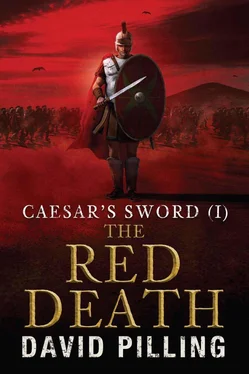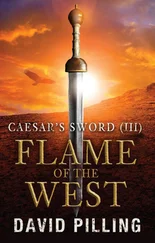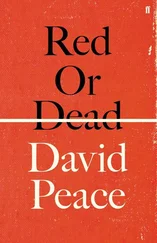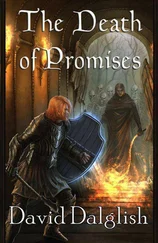David Pilling - The Red Death
Здесь есть возможность читать онлайн «David Pilling - The Red Death» весь текст электронной книги совершенно бесплатно (целиком полную версию без сокращений). В некоторых случаях можно слушать аудио, скачать через торрент в формате fb2 и присутствует краткое содержание. Год выпуска: 2013, Жанр: Исторические приключения, на английском языке. Описание произведения, (предисловие) а так же отзывы посетителей доступны на портале библиотеки ЛибКат.
- Название:The Red Death
- Автор:
- Жанр:
- Год:2013
- ISBN:нет данных
- Рейтинг книги:4 / 5. Голосов: 1
-
Избранное:Добавить в избранное
- Отзывы:
-
Ваша оценка:
- 80
- 1
- 2
- 3
- 4
- 5
The Red Death: краткое содержание, описание и аннотация
Предлагаем к чтению аннотацию, описание, краткое содержание или предисловие (зависит от того, что написал сам автор книги «The Red Death»). Если вы не нашли необходимую информацию о книге — напишите в комментариях, мы постараемся отыскать её.
The Red Death — читать онлайн бесплатно полную книгу (весь текст) целиком
Ниже представлен текст книги, разбитый по страницам. Система сохранения места последней прочитанной страницы, позволяет с удобством читать онлайн бесплатно книгу «The Red Death», без необходимости каждый раз заново искать на чём Вы остановились. Поставьте закладку, и сможете в любой момент перейти на страницу, на которой закончили чтение.
Интервал:
Закладка:
“It does not feel that way,” I replied, grimacing as I massaged my neck. The butcher had thrashed me with a heavy stick, and there was barely a patch of flesh on my meagre body that was not tender.
“The fates direct us there,” said Felix, pointing at the Hippodrome, about a quarter of a mile away. Along with the walls and towers of the Great Palace, the stadium dominated the skyline.
“If we wish to thrive, syntrophos,” he went on, “then we must join a faction, or leave the city. Do you want to leave?”
I shook my head. Since arriving in Constantinople I had not once ventured outside the walls. It was my home now, and life beyond the maze of streets, alleyways and plazas that I had come to know so well seemed unimaginable.
“Join a faction, and learn a skill,” said Felix, “or several skills. We are young enough to learn. Horse-riding, chariot racing, anything we like. What do you say?”
“They may not take us,” I pointed out.
“Nonsense,” he replied airily, “the Greens and the Blues are always looking for new recruits, especially young ones. Many of their apprentices find the training too rigorous and drop out.”
Or were seriously injured, sometimes even killed, he might have added. I let myself be persuaded, and that same day we made our way to the Hippodrome and presented ourselves at the Black Gate.
The guard lounging by the gate was a bored veteran with a missing eye and little to do. He responded to our entreaties with a growl, and threatened to whip our hides if we didn’t make ourselves scarce.
“Our hides have been whipped once today already,” said Felix, who was fearless, “see for yourself.”
He tore off his filthy jerkin to display the livid welts on his back, some of which were still bleeding. The guard, evidently not so cruel a man as he appeared, blanched at the sight.
“For God’s sake, put your jerkin back on,” he begged, “so you want to join the circus, do you? Wait here a moment.”
We sat on the steps and waited. I toyed with a loose stone and watched the people passing the Palace of Antiochos, a large hexagon-shaped building opposite the Hippodrome. There was a group of orthodox Greek priests among them, tall black-robed figures with long grey beards, marching along like so many angry crows as they furiously debated theology with a pale little monk whom I assumed to be a visitor from Rome. The churches of Constantinople and Rome were forever at each other’s throats, wrangling about the true nature of Christ and the Divinity.
The guard came back with a tall, darkly handsome young man, of noble bearing and stature, but dressed in a torn and shabby tunic.
“Well, here they are,” said the guard, stopping at the top of the steps and gesturing at us, “what do you think? Skinny little brutes. Not good for much except fetching and carrying.”
“I will be the judge of that, soldier,” replied the youth. The guard, who was at least twenty years his senior, stiffened at the sarcasm in his tone.
The youth beckoned at us. “My name is Leo,” he said, “I am one of the principal trainers here. Let me have a closer look at you.”
We obediently trotted up the steps. I noted that Leo was muscled like an acrobat, and had something of the caged animal about him, an unpredictable loose-limbed vitality. He had difficulty standing still, and shifted from one sandaled foot to the other as he spoke to us.
He snapped his fingers to dismiss the guard, who wandered away with a thunderous expression on his face. “So, boys,” he said, “I understand you wish to join the circus. Better to earn a living wage and sleep with a roof over your heads than starve in the gutter, eh?”
“Yes, sir,” we chorused.
Leo smiled crookedly and folded his muscular brown arms. “We get hundreds of little street-rats like you two,” he said, “and turn away most of them. We’re a working circus, not a bloody orphanage. Impress me.”
His voice, which always possessed a soft and musical quality, had taken on an aggressive tone that made me bristle. “I can box,” I said, taking up what I imagined to be a fighter’s stance and balling my little fists, “and ride a horse.”
This was an exaggeration. I had not backed a horse for years, ever since Clothaire’s Sarmatians let me ride one of their beasts during the journey from Paris. I didn’t care. Something about Leo’s manner irked me, and I was determined that he would not turn us away.
“You have a strange accent,” he said, cocking his head and looking me up and down, “where are you from?”
Britannia, I told him.
“Interesting. We don’t get many of your people. What about you?”
He spoke to Felix, who copied me and adopted a fighting stance. “I can also box,” he said stoutly, “and anything else I turn my mind to.”
Leo’s smile widened into a toothy grin. “We shall see,” he said, “come. You have persuaded me into giving you a trial.”
We should have turned and ran away then, and saved ourselves a world of pain and grief. But we were not to know the future, or that Felix’s fate-stones had lied to him.
Leo took us through the passage beyond the Black Gate onto the race-track. I had occasionally wormed my way into the arena and watched the races from the standing area above the cheap stalls, but never stood on the track itself. That privilege was reserved for the athletes and performers, a few scattered groups of whom were in training as Leo led us out.
Seen from the track, the vast scale of the Hippodrome stole my breath away. It was based on the old Circus Maximus in Rome, but surpassed that in size and magnificence. The southern end was formed into a curved tribune or U-shaped structure, while the northern end was occupied by the Starting Boxes, from which the chariot teams would emerge at the beginning of a race. There were twelve boxes, one for each chariot, and the roof was crowned by a statue of four gilded horses cast in bronze.
Marble seats for senators and other wealthy dignitaries were located nearest the track, with wooden benches for the poorer citizens above. Above those were the standing-room only areas that I used to squeeze into. At the eastern end of the Hippodrome was the Kathisma or imperial lodge, which the Emperor and his family accessed via a passage connecting the lodge to the Great Palace. Here the Emperor had his own private box to watch the entertainment in the arena below. It was decorated with silken hangings and tapestries worked in gold and imperial purple.
During previous visits to the Hippodrome I had beheld the Emperor Anastasius in the imperial box, and was surprised and disappointed to find that the most powerful man in the Empire was aged and ugly, bent under the weight of years and perpetual duty.
All this my eyes took in as I stood and looked around at that huge enclosed space. Leo allowed me and Felix to stare awhile, grinning at our awestruck expressions.
The spine of the track itself was lined with bronze statues of horses and chariot drivers, as well as extraordinary monuments to imperial glory and excess. One was the Tripod of Platea, a massive stone tripod cast centuries before to celebrate an age-old victory of the Greeks over the Persians. The peak of the tripod was adorned by a golden bowl supported by a trio of serpent heads. The spine and edges of the track were also decorated with statues of the various gods, emperors and heroes of Greek and Roman legend.
“They put me in mind of you two,” remarked Leo, jerking his thumb at a statue of Romulus and Remus, the infant founders of Rome, suckling from the wolf that nurtured them in the wild, “just beware of the wolf’s jaws, eh?”
Chapter 7
Leo wasted no time in putting us on trial. Since we were young, the trials were more of courage and patience than ability. My claim to be able to ride was tested when he swung me onto the back of a lively Arab mare, and made her trot in a circle while I clung on. I was allowed no saddle or harness, and had to dig my fingers into the Arab’s mane to save myself from falling.
Читать дальшеИнтервал:
Закладка:
Похожие книги на «The Red Death»
Представляем Вашему вниманию похожие книги на «The Red Death» списком для выбора. Мы отобрали схожую по названию и смыслу литературу в надежде предоставить читателям больше вариантов отыскать новые, интересные, ещё непрочитанные произведения.
Обсуждение, отзывы о книге «The Red Death» и просто собственные мнения читателей. Оставьте ваши комментарии, напишите, что Вы думаете о произведении, его смысле или главных героях. Укажите что конкретно понравилось, а что нет, и почему Вы так считаете.












